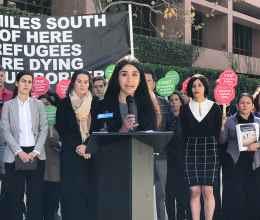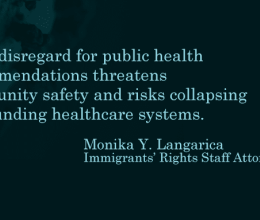Donald Trump's campaign promises and his victory last week have created deep anxiety among immigrants and our allies in California. Within the ACLU of California, many of us feel directly and personally affected by threats to our communities. This is all too real.
>> Action: Tell Donald Trump to stand up to hate
But we are not alone. We have each other. And we, the ACLU, stand by you. As we have fought for the constitutional and human rights of immigrants for nearly 100 years, we will continue to fight any efforts to implement Trump's unconstitutional immigration proposals. And we are joined by a broad community of Californians in our unwavering commitment to immigrant families and communities.
California has been a national leader at the forefront of our struggle for immigrants' rights, having already enacted a series of protections for immigrants. In passing the TRUST Act in 2014 and the TRUTH Act earlier this year, California created protections for people who come into contact with immigration authorities through local law enforcement. In a recent joint statement, state legislative leaders affirmed: "California is—and must always be—a refuge of justice and opportunity for people of all walks, talks, ages and aspirations—regardless of how you look, where you live, what language you speak, or who you love."
There are also important rights under the U.S. Constitution that protect all Californians—regardless of immigration status. While we wait to see how the Trump administration's policies unfold, here are some of the most important ways you can protect your rights right now:
- Educate and equip yourself, whether you are undocumented or a lawful permanent resident. Read this deportation toolkit from the ACLU of San Diego.
- Create a safety plan with your loved ones in case you are detained, including how to find legal help if needed.
- Avoid contact with Immigration and Customs Enforcement (ICE), one of the federal agencies responsible for deportation. If you apply for immigration benefits, you may come in contact with ICE—check with a lawyer before making any changes to your status.
- Avoid contact with the criminal justice system, including by taking care of tickets and keeping your car in good repair.
- Read these tips for how to behave when approached by ICE or other law enforcement, on foot or in your car. (Here is another resource, with more detailed information.)
- If on foot, ask: "Am I free to go?" If "yes," leave calmly. If "no," ask to know why they are stopping you.
- Exercise your rights to remain silent and to speak to a lawyer. To assert your rights, you must tell the officer you do not want to answer any questions and you wish to speak to a lawyer.
- Do not answer any questions about your immigration status. Do not sign any papers that you do not understand.
- You do not have to consent to a search. If an officer asks for permission to search your clothing, belongings, or car, say, "I do not consent to a search."
- Carry your "rights card" and show it. Also carry identification—it may help you avoid being arrested.
- If ICE agents (who sometimes identify themselves as "police") come to your home:
- Do not open the door.
- Ask the officers to identify themselves.
- Ask to see a warrant—ask the officer to slip the warrant under the door or hold it up to the window. A valid warrant to search your home will have your address on it and be signed by a judge.
- If officers force their way into your home, do not physically block them, but do tell them you do not consent to a search if they enter.
- You have a right to take photos and video of your interactions with law enforcement in public. Download the ACLU's mobile justice app for free.
- If you believe you may be eligible for the Deferred Action for Childhood Arrivals ("DACA") program, read this resource. Highlights:
- If you do not currently have DACA, we recommend that you do not apply at this time.
- If you already have DACA and are considering whether to apply to renew it, immigration authorities already have the information on your original application, so there is less risk in submitting the renewal application.
Please contact us if you believe your rights are violated, and check back with the ACLU as we learn more about what the Trump administration's policies will mean for immigrants. Standing together we will fight for each other's rights and resist unconstitutional and abusive actions by immigration authorities.
Andrés Dae Keun Kwon is the Equal Justice Works Emerson Fellow at the ACLU of Southern California. Julia Harumi Mass is a senior staff attorney with the ACLU of Northern California.








